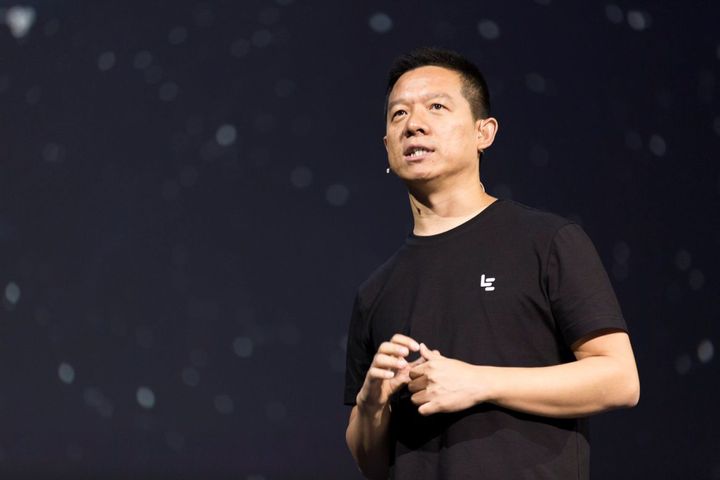 Jia Yueting Risks All in Evergrande's Bet on Faraday Future
Jia Yueting Risks All in Evergrande's Bet on Faraday Future(Yicai Global) June 28 -- Embattled Chinese entrepreneur Jia Yueting is putting his control of Faraday Future on the line in his latest roll of the dice to get the electric vehicle startup off the ground.
Faraday Future secured a USD2 billion capital injection from Hong Kong-based property giant Evergrande Group earlier this week as well as the first round of funding from the US government, rekindling hopes for Jia and the automaker amid a recent swamp of negative publicity.
However, the agreement with Evergrande could lead to Jia's exit from the Los Angeles-based firm. Under the deal, the controversial figure will lose control if he cannot mass produce the flagship FF91 model by the end of the year. So, will he succeed in finally turning the business around?
In an internal letter in May, Jia said that several figures from Ford Motor and Tesla had joined Faraday Future to take charge of main operations including finance and information technology, while most key suppliers and contractors were already in place. The company confirmed earlier this month that it had received the go-ahead for a new plant in Hanford, California, and testing of the first batch of production equipment had been completed.
The firm chose Nevada to build the plant at first due to government support and other considerations but scrapped the idea last September because of mounting debts.
China Imports
Faraday Future touts the FF91 as the world's first large-size new energy vehicle capable of rivaling Bentley and other top international luxury car brands, and features an intelligent mobility ecosystem. The car is reportedly expected to sell for USD150,000 to USD300,000 in the US and over CNY2 million (USD302,000) in China, twice the price of Tesla's Model X.
Construction of Faraday Future's Chinese plant in Nansha, Guangzhou, is still at an initial stage despite the firm's plans to start mass production at the end of this year. It appears unrealistic to expect extensive output to start in China within such a short space of time.
The first batch of FF91 cars for the Chinese markets are likely to be imported, Mei Songlin, vice president at auto industry research agency JD Power said, adding that ongoing trade friction between China and the US is bringing uncertainty and could lead to higher prices.
Despite controversy surrounding Jia, the capital market has continued to offer him and his company new opportunities, culminating in Evergrande's decision to come onboard.
"Faraday Future is headquartered in the US, where local governments have pledged considerable support," Mei said. "Evergrande's 45-percent indirect shareholding and the approval of the USD2 billion funding deal only came to light a few days ago but the two companies must have kicked off talks a long time ago, and Faraday Future probably received part of the money as early as late last year."
Fighting Chance
The reason that Jia still has a cat's chance is that many people are buying into his new ideas, said Wang Ke, executive director at a leading strategic management consultancy Roland Berger. "Jia has a unique vision, which he has tried to deliver through several business ventures like Leshi. He failed in the past because he overstretched his resources while expanding business coverage."
Almost a year has elapsed since Jia resigned as chairman of Leshi Internet Information and Technology, the listed arm of Jia's debt-ridden LeEco tech empire, and turned his attention exclusively to the carmaking business in the US. Local governments there are concerned about Faraday Future's development and have offered a lot of support.
Judging by popular opinion and support from parties at various levels, the firm is making headway with recruitment and funding, while plant construction is underway in China and abroad. The general attitude of private investors has also started to change in favor of Faraday Future. Leshi's stock rallied against the market downturn on news of Evergrande's investment in Faraday. Although Jia has already left the company, it is still an indication that his personal reputation may be recovering.
Faraday Future still faces a bumpy road ahead. If mass production of the FF91 is not achieved this year then Jia's position as decision-maker will be undermined in accordance with his agreement with Evergrande. The company's business operations in China remain at a fledgling stage, giving rise to uncertainties as to growth in the market.
Regarding the FF91's production schedule, Evergrande said that the product had already gone through a series of rigorous road tests in the US over one year, and the model fully meets conditions for mass production. The company has already started commissioning large-scale equipment at the Hanford plant, and comprehensive preparations for production will be complete later this year. The Nansha base is slated for operation in late 2019 or early 2020, with first phase production capacity slated to be around 100,000 units a year.
Questions about the business's viability still remain. Jia once admitted that research and development efforts for the FF91 in the US were running up USD15 million in costs every month, and at least USD10 billion was needed before large-scale roll-out of the first FF91 prototype could be achieved.
So far, the firm has raised USD2 billion, which might be sufficient to cover production cost, but mass output and plant construction in China will also be a pricey undertaking. Therefore, getting Chinese operations off the ground will pose a serious challenge for Faraday Future compared with its Chinese competitors, especially considering the firm's insistence on developing two main factories in China and the US.
Editor: William Clegg